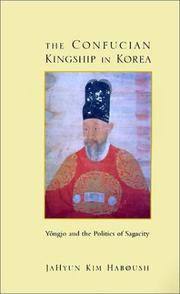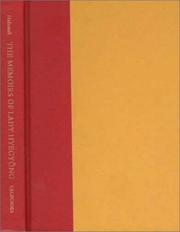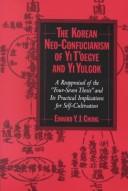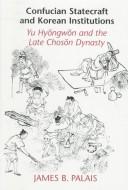| Listing 1 - 7 of 7 |
Sort by
|
Book
ISBN: 0977961370 Year: 2007 Publisher: Corée Yonsei University Press
Abstract | Keywords | Export | Availability | Bookmark
 Loading...
Loading...Choose an application
- Reference Manager
- EndNote
- RefWorks (Direct export to RefWorks)
Book
ISBN: 9780674281301 Year: 2014 Publisher: Cambridge, Mass. Harvard University Press
Abstract | Keywords | Export | Availability | Bookmark
 Loading...
Loading...Choose an application
- Reference Manager
- EndNote
- RefWorks (Direct export to RefWorks)
K9151 --- K9125.50 --- K9500.50 --- K9514 --- Korea: History -- early Chosŏn period (1392-1600) --- Korea: Genealogy and biography -- biography -- Chosŏn period (1392-1910) --- Korea: Politics -- history -- Chosŏn period (1392-1910) --- Korea: Politics -- state -- heads of state --- T'aejo, --- Yi T'aejo, --- Yi, Sŏng-gye, --- 太祖, King of Korea, --- 太祖, --- 李 成桂, --- 이 성계, --- 태조, --- Korea --- History
Book
ISBN: 0977961338 Publisher: Random House Joongang Yonsei University Press
Abstract | Keywords | Export | Availability | Bookmark
 Loading...
Loading...Choose an application
- Reference Manager
- EndNote
- RefWorks (Direct export to RefWorks)
K9154 --- K9150 --- K9574 --- K9125.50 --- J3357.80 --- Korea: History -- Chosŏn period -- Japanese invasion, Imjin war (1592-1598) --- Korea: History -- Chosŏn period (1392-1910) --- Korea: Defense and military -- navy --- Korea: Genealogy and biography -- biography -- Chosŏn period (1392-1910) --- Japan: History -- Chūsei -- Azuchi-Momoyama period -- Korean campaigns (1592-1598)

ISBN: 0231066562 0231066570 9780231066570 9780231066563 Year: 1988 Publisher: New York Columbia university press
Abstract | Keywords | Export | Availability | Bookmark
 Loading...
Loading...Choose an application
- Reference Manager
- EndNote
- RefWorks (Direct export to RefWorks)
K9155 --- K9150 --- K9040 --- K9030.50 --- K9125.50 --- Korea: History -- late Chosŏn period, isolation, Qing dependency (1600-1895), Manchu invasions (1627, 1637) --- Korea: History -- Chosŏn period (1392-1910) --- Korea: Philosophy and thought -- schools -- Confucianism --- Korea: Philosophy and thought -- history -- Chosŏn period (1392-1910) --- Korea: Genealogy and biography -- biography -- Chosŏn period (1392-1910) --- Yongjo King of Korea --- K9500.50 --- Confucianism and states --- -Korea: Politics -- theory, methodology and philosophy --- Korea: Politics -- history -- Chosŏn period (1392-1910) --- Jŏngjo, King of Korea, 1694-1776 --- Confucianisme. --- Yŏngjo, --- Koningen (vorsten). --- Confucianism and state --- State and Confucianism --- State, The --- Yŏngjo, --- Yi Yŏngjo, --- 英祖, --- 영조, --- K9509 --- Korea --- Kings and rulers. --- Politics and government --- -Jŏngjo, King of Korea, 1694-1776

ISBN: 0520200551 Year: 1996 Publisher: Berkeley, Calif. University of California Press
Abstract | Keywords | Export | Availability | Bookmark
 Loading...
Loading...Choose an application
- Reference Manager
- EndNote
- RefWorks (Direct export to RefWorks)
Civilization, Modern --- Princesses --- K9125.50 --- K9150 --- K9731 --- Royalty --- Courts and courtiers --- Eighteenth century --- Biography --- Korea: Genealogy and biography -- biography -- Chosŏn period (1392-1910) --- Korea: History -- Chosŏn period (1392-1910) --- Korea: Literature -- literary diaries, letters and accounts of travel --- Hyegyŏnggung Hong Ssi, --- Kyŏngŭi Wanghu, --- Hong Ssi, --- Crown Princess Hong, --- Hong, --- Lady Hong, --- Lady Hyegyong, --- Hyegyong, --- 惠慶宮洪氏, --- 惠慶宮 洪 氏, --- 혜경궁홍씨, --- 혜경궁 홍 씨, --- Korea --- History --- Kings and rulers. --- Asian literature --- History of Asia --- Hyegyonggung Hong Ssi --- anno 1700-1799 --- anno 1800-1899 --- North Korea --- South Korea

ISBN: 0585090947 9780585090948 0791422755 0791422763 0791499111 9780791422755 9780791422762 9780791422762 Year: 1995 Publisher: Albany SUNY Press
Abstract | Keywords | Export | Availability | Bookmark
 Loading...
Loading...Choose an application
- Reference Manager
- EndNote
- RefWorks (Direct export to RefWorks)
This comparative study of Yi T'oegye (1501-1570) and Yi Yulgok (1536-1584), Korea's two most eminent Neo-Confucian thinkers, is a seminal work on the Four-Seven Debate, the most significant and controversial intellectual event in the Korean Confucian tradition. The Four-Seven thesis, a magnificent example of East Asian Confucian discourse at its best, remains each thinker's masterpiece, a compressed but integrated systemization of metaphysics, ethics, and spirituality. It addresses fascinating philosophical, moral, and psychological questions about the fundamental problem of feelings and emotions, as well as their implications for moral and spiritual self-transformation.This book is indispensable for those interested in Korean thought or intellectual history. It will enable specialists in Confucian studies to understand unique paradigms of Korean Neo-Confucianism. It will stimulate comparative philosophers or religionists and general humanists to consider Korean Neo-Confucianism seriously as a major resource for understanding East Asian philosophy and religion.
Four beginnings and seven feelings thesis. --- Neo-Confucianism --- Philosophy, Korean. --- Korean philosophy --- Four-seven thesis --- Yi, Hwang, --- Yi, I, --- Li, Er, --- Li, Ligu, --- Li, Shuxian, --- Ligu, --- Sŏktam, --- Ujae, --- Yi, Sŏk-tam, --- Yi, Sŏktam, --- Yi, Ujae, --- Yi, Yulgok, --- Yul-gok, --- Yulgok, --- 李珥, --- 李 珥, --- 이 이, --- 이이, --- Four beginnings and seven feelings thesis --- Philosophy, Korean --- K9030.50 --- K9032 --- K9040 --- K9125.50 --- Confucianism --- Philosophy, Chinese --- History --- Korea: Philosophy and thought -- history -- Chosŏn period (1392-1910) --- Korea: Philosophy and thought -- works by individual philosophers --- Korea: Philosophy and thought -- schools -- Confucianism --- Korea: Genealogy and biography -- biography -- Chosŏn period (1392-1910) --- Yi, Hwang --- Yi, Hwang, - 1501-1570 --- Yi, I, - 1536-1584

ISBN: 0295805110 0295974192 9780295805115 9780295993782 9780295974552 0295974559 0295993782 9780295974194 Year: 1996 Publisher: Seattle : University of Washington Press,
Abstract | Keywords | Export | Availability | Bookmark
 Loading...
Loading...Choose an application
- Reference Manager
- EndNote
- RefWorks (Direct export to RefWorks)
Seventeenth-century Korea was a country in crisis--successive invasions by Hideyoshi and the Manchus had rocked the Chosòn dynasty (1392-1910), which already was weakened by maladministration, internecine bureaucratic factionalism, unfair taxation, concentration of wealth, military problems, and other ills. Yu Hyòngwòn (1622-1673, pen name, Pan'gye), a recluse scholar, responded to this time of chaos and uncertainty by writing his modestly titled Pan'gye surok (The Jottings of Pan'gye), a virtual encyclopedia of Confucian statecraft, designed to support his plan for a revived and reformed Korean system of government. Although Yu was ignored in his own time by all but a few admirers and disciples, his ideas became prominent by the mid-eighteenth century as discussions were underway to solve problems in taxation, military service, and commercial activity. Yu has been viewed by Korean and Japanese scholars as a forerunner of modernization, but in Confucian Statecraft and Korean Institutions James B. Palais challenges this view, demonstrating that Yu was instead an outstanding example of the premodern tradition. Palais uses Yu Hyòngwòn's mammoth, pivotal text to examine the development and shape of the major institutions of Chosòn dynasty Korea. He has included a thorough treatment of the many Chinese classical and historical texts that Yu used as well as the available Korean primary sources and Korean and Japanese secondary scholarship. Palais traces the history of each of Yu's subjects from the beginning of the dynasty and pursues developments through the eighteenth and nineteenth centuries. He stresses both the classical and historical roots of Yu's reform ideas and analyzes the nature and degree of proto-capitalistic changes, such as the use of metallic currency, the introduction of wage labor into the agrarian economy, the development of unregulated commercial activity, and the appearance of industries with more differentiation of labor. Because it contains much comparative material, Confucian Statecraft and Korean Institutions will be of interest to scholars of China and Japan, as well as to Korea specialists. It also has much to say to scholars of agrarian society, slavery, landholding systems, bureaucracy, and developing economies.
Sirhak school. --- Confucianism and state --- State and Confucianism --- State, The --- Silhak --- Silhakʾpa --- Philosophy, Korean --- Yu, Hyŏng-wŏn, --- Korea --- Politics and government --- -Sirhak school --- K9500.50 --- K9040 --- K9030.50 --- K9155 --- K9150 --- K9125.50 --- Korea: Politics -- history -- Chosŏn period (1392-1910) --- Korea: Philosophy and thought -- schools -- Confucianism --- Korea: Philosophy and thought -- history -- Chosŏn period (1392-1910) --- Korea: History -- late Chosŏn period, isolation, Qing dependency (1600-1895), Manchu invasions (1627, 1637) --- Korea: History -- Chosŏn period (1392-1910) --- Korea: Genealogy and biography -- biography -- Chosŏn period (1392-1910) --- Yu, Hyong-won --- -Sirhak school. --- -Confucianism and state
| Listing 1 - 7 of 7 |
Sort by
|

 Search
Search Feedback
Feedback About UniCat
About UniCat  Help
Help News
News